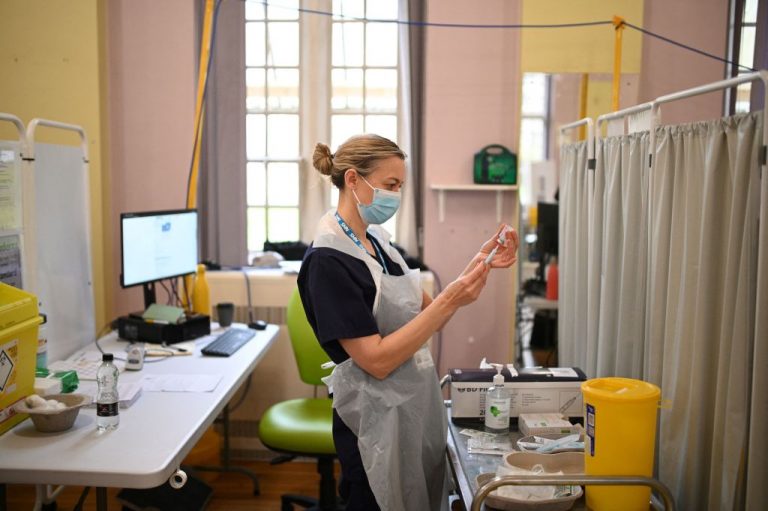Heart inflammation occurs more often for individuals younger than 40 after receiving the Moderna Coronavirus Disease 2019 (COVID-19) vaccine than from COVID-19 itself, according to a new study published in Nature Medicine on Dec. 14 by a group of UK researchers.
In England, 38,615,491 adults were vaccinated with at least one dose of the AstraZeneca ChAdOx1 vaccine (20,615,911 adults), Pfizer-BioNTech BNT162b2 vaccine (16,993,389 adults), or Moderna mRNA-1273 vaccine (1,006,191 adults) between Dec. 1, 2020 and Aug. 24, 2021.
A large number of deaths were reported during the study period, including “1,615 and 1,574 admissions or deaths related to myocarditis and pericarditis, respectively (14 patients had both), and 385,508 related to cardiac arrhythmias.” 397 deaths occurred within the first 28 days after any dose of vaccine.
To compare heart inflammation risk, the authors reported incidence rate ratios (IRRs), which compare the incidence of an event between two groups, and 95 percent confidence intervals (CIs), which contain the true mean of the population with 95 percent confidence.
An elevated risk of myocarditis, or inflammation of the heart muscle, was observed within the first 7 days after the first dose of the AstraZeneca (IRR 1.76; 95% CI 1.29, 2.42), Pfizer-BioNTech (IRR 1.45, 95% CI 0.97, 2.12), and Moderna (IRR 8.38, 95% CI 3.53, 19.91) vaccines.
Success
You are now signed up for our newsletter
Success
Check your email to complete sign up
Myocarditis risk was higher in the first 7 days after the second dose of the Pfizer-BioNTech (IRR 1.75, 95% CI 1.13, 2.70) and Moderna vaccines (IRR 23.10, 95% CI 6.46, 82.56). The risk of myocarditis was also increased within the first 28 days after a positive SARS-CoV-2 test (IRR 9.76, 95% CI 7.51, 12.69).
Mixed results were observed for pericarditis, or inflammation of the sac-like tissue surrounding the heart, within the first 28 days after vaccination. The authors “observed a decreased risk of pericarditis following the first dose of [AstraZeneca] ChAdOx1 (IRR 0.74, 95%CI 0.59, 0.92), in contrast with an increased risk in the 1–28 days following a SARS-CoV-2 positive test (IRR 2.79, 95% CI 1.80, 4.32). No association was observed with the [Pfizer-BioNTech] BNT162b2 or [Moderna] mRNA-1273 vaccine.”
Overall, the authors reported that the excess myocarditis events in the 28 days following adenovirus or mRNA vaccination was lower than in the first 28 days after SARS-CoV-2 infection. However, for individuals aged 40 and younger, the study “estimated the excess in myocarditis events following SARS-CoV-2 infection to be 10 per million with the excess following a second dose of [Moderna] mRNA-1273 vaccine being 15 per million.”
“Further research is required to understand why the risk of myocarditis seems to be higher following [Moderna] mRNA-1273 vaccine,” they stated.
Heart inflammation in children
A preprint study published in medRxiv on Sept. 8 by U.S. researchers showed similar results in children aged 12 to 17. The authors reviewed data between Jan. 1 and June 18 from the Vaccine Adverse Event Reporting System (VAERS), maintained by the U.S. Centers for Disease Control and Prevention (CDC) and the Food and Drug Administration (FDA).
Healthy boys without underlying health conditions were at higher risk of a cardiac adverse event (CAE) after mRNA COVID-19 vaccination than hospitalization from COVID-19 within 120 days. Search criteria included “chest pain, myocarditis, pericarditis and myopericarditis to identify children with evidence of cardiac injury,” followed by a harm-benefit analysis taking into account literature with COVID-19-related hospitalization risk.
According to the study, “At times of low adolescent COVID-19 hospitalization rates, such as in June 2021, a CAE from the second dose of an mRNA vaccine in a healthy 12–15-year-old boy was 13.7-fold more likely, at 162.2 per million, than the 120-day risk of COVID-19 hospitalization. The rate of post-vaccination CAE for boys 12-15 years without comorbidities (162.2/million) receiving their second vaccination dose exceeds their current 120-day COVID-19 hospitalization risk (44.4/million) by 3.7 times.”
Furthermore, “In 16–17-year-old boys without comorbidities, the risk of post-dose two vaccination CAE exceeds their current 120-day hospitalization risk by 2.1 times (94.0/million vs. 44.4/million per 120-days).”
Heart inflammation usually occurred soon after vaccination, with “a median of 2 days following vaccination, and 91.9% occurred within 5 days.”

















